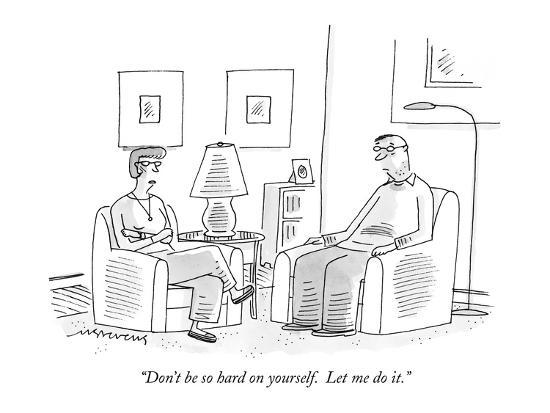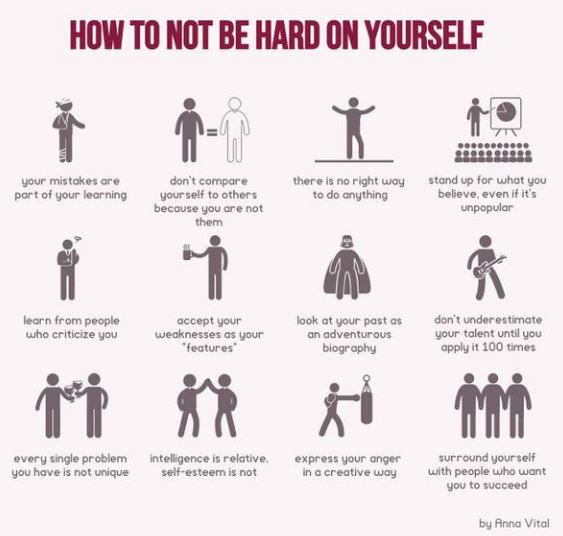
In a world that’s obsessed with perfection, it can be easy to be critical of ourselves and judge ourselves to not measuring up. The way to become more accepting is to realize that as human we are fallible and there’s nothing wrong with and that our worth is determined by us. Begin shifting toward a healthier way of being by keeping an eye out for these five signs that you’re being too hard on yourself. (Estimated reading time: 5 minutes)
“Strive for progress. Not perfection.”
— Unknown
“Always do your best.”
This is one of the most common phrases we hear growing up. My family and my teachers said it to me on a regular basis. Although I understood what they meant, I had no idea what ‘doing my best’ looked or felt like. Like most people, I defaulted to society’s definition of ‘doing your best’ – I eventually found out what a huge mistake this was.
We have a competitive streak ingrained in us – a desire to race to the top. In academia, we strive for stellar grades, and in the professional world, we exhaust ourselves climbing the corporate ladder to grow our bank accounts. For the sake of beauty, we starve ourselves to fit into a pair of skinny jeans.
For the unknowing achiever the quest to be prettier, smarter, and more successful never ends. Given the societal pressure we face, it’s easy to get sucked into the vortex of perfection and judge ourselves for not measuring up.
It took me many years to recognize that I was a captive. As an ex-perfectionist, I somehow felt justified in setting unreasonably high standards and goals, then criticize myself when I struggled to reach them. The voice in my head was ruthless and unkind.

One day I came across a book called The Four Agreements by Don Miguel Ruiz that redefined what ‘doing my best’ meant for me and changed my outlook on what it means to be hard on yourself.
‘Always do your best’ is the fourth agreement in the book. It says:
“Always Do Your Best – Your best is going to change from moment to moment; it will be different when you are healthy as opposed to sick. Under any circumstances, simply do your best, and you will avoid self-judgement, self-abuse, and regret.”
What I love about Miguel Ruiz’s interpretation is that it removes the burden of perfectionism, replacing it with self-love and compassion. It reminds us to be kind to ourselves.
We are not robots. We are human beings. Flawed. Imperfect. Fallible. We are sometimes, slow and inefficient, and at other times bruised and hurting. And that’s perfectly okay.
This doesn’t mean that we should set the bar lower and slack off. It is possible to aim high and strive to achieve our dreams without beating ourselves down in the interim. What needs to change is the way that we speak to ourselves on the way to those milestones.

We need to develop a sensitivity that alerts us of the hard-driving ways that erode our self-esteem and drain our spirit. Focusing on what we’re doing well, right now, is the first step towards making a healthy shift. As spiritual leader Eckhart Tolle says, “the decision to make the present moment your friend is the end of the ego.”
If you’re ready to make that transition into self-acceptance, watching out for these five signs of will help you weed out thoughts patterns that indicate you’re being too hard on yourself:
1. You’re never satisfied with what you do: When you’re too hard on yourself, you’ll never feel like what you do is good enough. You’ll always manage to find mistakes and blow them out of proportion. You will fixate on everything wrong instead of considering what you’re doing right. Whether it’s a creative project or a relationship you pour time into, the least you can do is give yourself a pat on your back, because that is what will motivate you to keep going.
2. Life feels like one big competition: Constantly looking over your shoulder to see what other people are up to is another sign of being overly self-critical. A big part of you may wish for what others have – financial success, loving relationships, or a healthy body. You’ll be oblivious to the hard work and challenges that they had to face to get there. The illusion of their easy success will leave you feeling dissatisfied and frustrated. You’ll always be on the edge because you’re afraid of not measuring up to other people’s expectations.
3. You can’t accept praise or offer praise to others: When someone pays you a compliment, you may suspect that their intention is insincere. Your negativity will block you from receiving their acknowledgement of your strengths. When you can’t appreciate your own efforts, you will assume that others can’t either. A skewed self-concept will also affect how you judge others. You can never feel truly happy when others succeed or appreciate them because it makes you feel inadequate and unworthy.
4. You ignore your wins and magnify your mistakes: You know that you’re being too hard on yourself when you can’t experience a real sense of joy at your own accomplishments. You may either play down your success or deny its significance by attributing it to the influence of outside involvement. On the flip side, you’ll be quick to notice your flaws and bring them into full view. Deep down you’ll find that you’re pleased to see any confirmation of your inadequacy. When you’re biased towards failure instead of your successes, there’s an imbalance you need to address.
5. You’re unkind to yourself and ignore your needs: When you’re hard on yourself, your inner critic plays a dominant role in your self-talk. It can make you say the mean things such as “you’re worthless”, “you always mess up” or “things just never go your way”. This dysfunctional and pessimistic language can cause stress and emotional pain if left unchecked. It could even cause you to neglect your needs.
For example, if you’re continually working because you’re fixated on making more money or getting a promotion, you might skimp on self-care like cooking healthy meals, getting a good night’s sleep, or exercising regularly. In the end, you’ll feel tired and exhausted. A classic sign that you’re too hard on yourself.
The next time that you find yourself being hard on yourself, take a step back and imagine what someone who genuinely cares about you would say. You can be sure that they will speak to you with compassion and care. Their soothing words will make you feel worthy, regardless of what you do in the material world. If they can see the love and light that shines brightly within you, you can see it too.
All my best on your journey,
Seline

Reflection Question: Can you remember a time in your life when you were too hard on yourself? What were some of the things that you did and said?
Did you like this post? Sign up below, and I’ll send you more awesome posts like this every week.

Hey Seline – I needed to hear this so thank you for sharing it! I have always been very hard on myself, partly due tot the fact that I was forced to grow up and be more like an adult than a kid at a very young age.
It’s only gotten worse over the years as I got older and now in my adult years. I’m trying to get better with it and this blog was a big push fro me so thank you again! 🙂